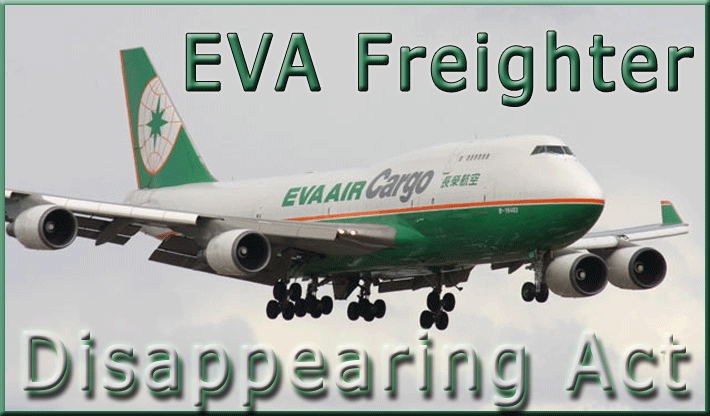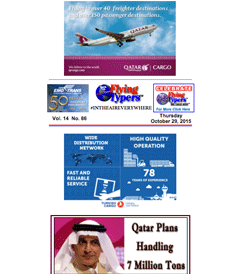| 
Unlike
many of its peers, U.S.-based global logistics provider
BDP International has seen air cargo demand soar this
year, although the company’s bullish run has slowed
as West Coast port congestion has been addressed. Senior
Vice President of Global Air Freight at BDP Gary Phelps
told FlyingTypers the company’s air cargo division
had seen strong growth in the first half of the year compared
to the same period of 2014.
“BDP experienced a
robust global tonnage increase of 20.3 percent in chargeable
kilos over the first six months of the year and a forty-six
percent year-over-year increase in air exports from the
Americas during the period due to the U.S. West Coast
Port dispute,” he said. “BDP provided multiple
charters of key raw materials to Asia and Europe from
the U.S.
“However, the global
air market has recently cooled from June 2015 forward
to the normal levels experienced in 2014.”
According to Phelps, air
to ocean conversion began in late May and will continue
through October this year, after which some summer bellyhold
capacity would be withdrawn. “The ocean less-than-container-load
(LCL) market is seeing substantial global growth,”
he said. “BDP customers can quickly and easily move
between services based on their transit and cost requirements.”
He also said that summer
passenger wide-body capacity had pushed global spot market
rates lower, which had affected only-cargo aircraft and
passenger bellyhold rates, although demand for air cargo
filling upper and lower decks had remained “significant.”
Shifting gears to lower
levels of air volume has seen BDP seek ways to provide
more value to air freight customers by expanding its Unit
Load Device (ULD) program on key lanes. “The intact
ULD movements result in quicker transit and enhanced cargo
handling,” he said. “Our expansion of ULDs
from Europe to the U.S. and Asia will result in increased
customer satisfaction. BDP's core carrier program has
strengthened our global procurement and added customer
score card improvements in landed cost.”
Phelps expects air cargo
volumes to begin ramping up in October and November to
levels similar to those recorded in 2014.
“BDP will focus on
key gateway locations for further expansion of ULDs and
service improvements” he said. “One example
of expanded service is our e-freight technology. BDP has
undertaken a global process to include e-Freight, which
will be completed before 2016. We expect our global e-Freight
technology to improve freight movement and cost structures
and reduce paper tender.
“This is being deployed
with our core carrier group and will have a positive effect
for our customers in 2016.”
Looking ahead, he said BDP
saw “positives” on the Trans-Atlantic west
bound and above market growth on its U.S. air exports.
“The U.S. dollar is strong and is reducing overall
market growth for exports,” he added. “This
trend will most likely continue through the spring of
2016.
“We remain solution-focused
with our customers being offered new Unit Load Device
origins and destinations. This allows BDP to tender later
and retrieve customer consignments earlier. In addition,
handling is reduced and the cargo touch is an overall
better experience. Our global gateway focus allows improvement
with our customers’ wallet spend.”
He also expects further
growth to and from India in 2015. “We have a new,
mixed ULD program that is going into production on October
1, 2015,” he said.
“This new mixed ULD
BDP ‘AirStar’ program from the U.S. to India
will assist with intact movements, no splits of cargo,
and reliable bonded destination delivery to the following
airports: Delhi, Bangalore, Mumbai, and Madras. We anticipate
Wednesday and Saturday departures from Chicago and New
York for the new U.S. to India ‘AirStar’ program.
Trials will begin this month followed by the full market
launch.”
BDP International is also
taking a big step forward in Asia with the expansion of
its IATA license holding stations. “We are expanding
our presence at Taipei, Kuala Lumpur, Bangkok, Jakarta
and Saigon before December 31, 2015,” said Phelps.
“Our global core carriers are lined up to support
our 2016 expansion.
“We expect our Asia
airfreight strategy to fall in line with our key performance
indicators. Growth will occur for BDP Asia to Europe and
the U.S. Currently, Seoul and Singapore lead our airfreight
charge in Asia. We will be making further 2016 expansions
in Hong Kong and Shanghai with our Class A license.”
BDP USA has also expanded
its Air Import Gateways to include new ULD Services from
Europe to Atlanta, Chicago, Dallas, Los Angeles, New York,
and Miami. “The new Air Import Gateways were developed
by Director of the Americas Kevin Connor and started receiving
cargo on August 1, 2015,” he said.
“We expect our Americas
imports to expand significantly in 2016. The initial market
tests were performed from Belgium, France, Germany, Netherlands,
and the United Kingdom. Director of EMEA Patrick Olyhoeck
is leading our Trans-Atlantic expansion. In addition,
we have added new team members to our global airfreight
team, allowing us to keep pace with our growth. We expect
further expansion of specialized air product team members
in Asia and Europe.”
He said the key challenges
facing global forwarders in 2016 were managing capacity
versus demand, dangerous goods handling, key vision and
strategy formulation, and execution on service and yield
management.
“We are reviewing
weekly capacity versus demand in our key global market
sectors and working with our core carriers to expand tonnage
and on time performance,” he said.
“We look at e-Freight
to manage our future regulations and customs interactions
globally. This will provide BDP and our customers a competitive
advantage in the market place. Global rates go up and
down and track to jet fuel with the capacity versus demand
factor adding or deleting margin.”
BDP also plans to continue
expanding. “We see big growth in the Middle East,
India, and the countries participating in the Trans- Pacific
Partnership (TPP)—Australia, Brunei Darussalam,
Canada, Chile, Japan, Malaysia, Mexico, New Zealand, Peru,
Singapore, and Vietnam.
“BDP is present in
all TPP countries and we expect exceptional growth in
airfreight.”Sky King
Fifteen
years ago, BDP and Colombia-based Interflex S.A. Group
established a business relationship that only grew
stronger over time.
In 2013
the two companies announced a partnership—a
joint venture—that took the relationship to
an even higher level. The company now operates as
BDP International Colombia under a management team
led by General Manager Enrico Benedetti.
The
BDP offer includes air, sea, inland, project cargo,
and more.
Contact: enrico.benedetti@bdpint.com |
|




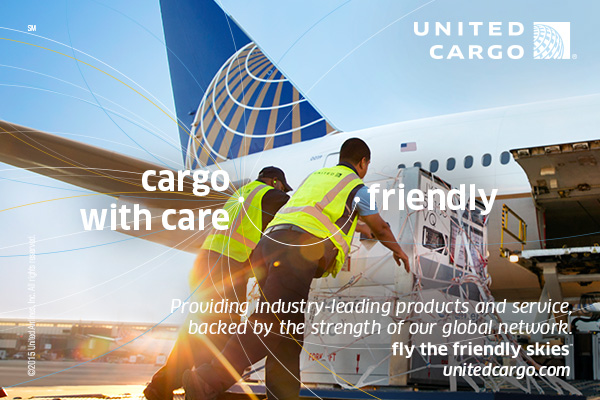




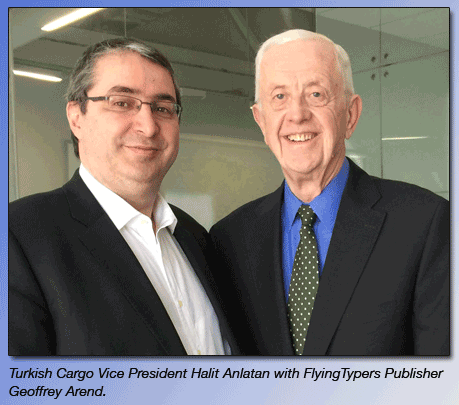 “It’s a new era for
air shippers,” Halit Anlatan, Turkish Airlines Vice
President Cargo told FlyingTypers.
“It’s a new era for
air shippers,” Halit Anlatan, Turkish Airlines Vice
President Cargo told FlyingTypers.




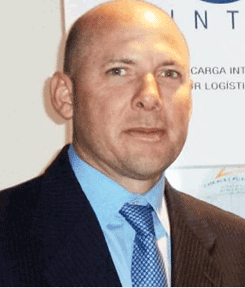 Latin
Opportunity
Latin
Opportunity